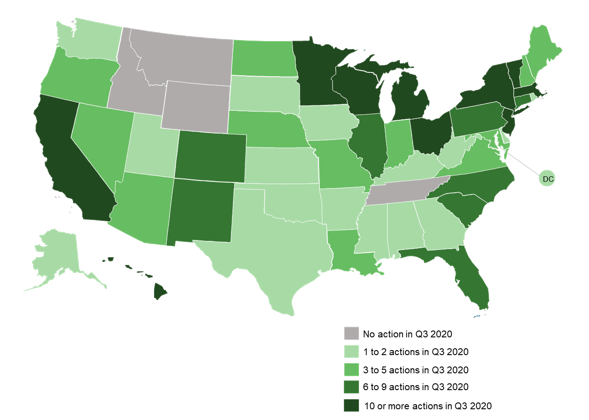The 50 States of Electric Vehicles: Utilities Commit To Electrify Their Vehicle Fleets in Q3 2020
Raleigh, NC – (November 4, 2020) The N.C. Clean Energy Technology Center (NCCETC) released its Q3 2020 edition of The 50 States of Electric Vehicles. The quarterly series provides insights on state regulatory and legislative discussions and actions on electric vehicles and charging infrastructure.
The report finds that 46 states and the District of Columbia took actions related to electric vehicles and charging infrastructure during Q3 2020 (see figure below), with the greatest number of actions relating to rebate programs, rate design for electric vehicle charging, studies, and charging station deployment. A total of 305 electric vehicle actions were taken during Q3 2020, with the most active states being Massachusetts, New York, New Jersey, California, Vermont, and Hawaii.
The report discusses three trends in electric vehicle actions taken in Q3 2020: (1) utilities committing to electrify their own vehicle fleets, (2) utilities proposing a variety of managed charging programs, and (3) state regulators and utilities prioritizing investment in low-income communities.
Q3 2020 State and Utility Action on Electric Vehicles

“During Q3 2020, we saw governors, state lawmakers, regulators and utilities themselves taking bold steps to expand the market for electric vehicles,” said Brian Lips, Senior Policy Project Manager at NCCETC. “Of particular interest has been including mechanisms to improve low-income access to electric transportation.”
The report notes five of the top policy developments of the quarter:
- California’s Governor establishing statewide zero-emission vehicle sales goals;
- The New York Public Service Commission approving a make-ready infrastructure incentive program;
- New Hampshire regulators issuing an order on electric vehicle rate design;
- The California Public Utilities Commission approving over $400 million in charging infrastructure investments for Southern California Edison; and
- Utilities in Connecticut and New Mexico filing major electric vehicle plans.
“In addition to proposing transportation electrification plans, we’re seeing many utilities adopt electrification goals for their own vehicle fleets,” noted Autumn Proudlove, Senior Policy Program Director at NCCETC. “Most of these goals are aiming for full or partial light-duty fleet electrification by 2030.”
View the 50 States of Electric Vehicles Q3 2020 Executive Summary
View and Purchase the 50 States of Electric Vehicles Q3 2020 update FULL Report
View other 50 States Reports – Solar, Grid Modernization and Electric Vehicles
ABOUT THE N.C. CLEAN ENERGY TECHNOLOGY CENTER
The N.C. Clean Energy Technology Center, as part of the College of Engineering at North Carolina State University, advances a sustainable energy economy by educating, demonstrating and providing support for clean energy technologies, practices and policies. It serves as a resource for innovative, sustainable energy technologies through technology demonstration, technical assistance, outreach and training. For more information about the Center, visit: http://www.nccleantech.